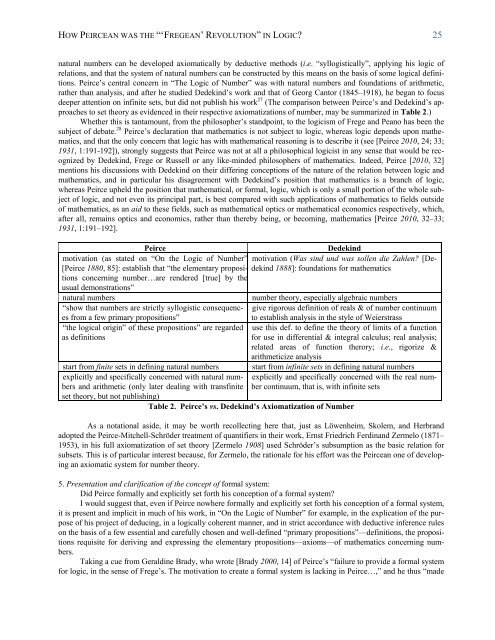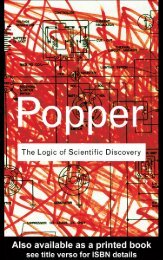Create successful ePaper yourself
Turn your PDF publications into a flip-book with our unique Google optimized e-Paper software.
HOW PEIRCEAN WAS THE “‘FREGEAN’ REVOLUTION” IN LOGIC? 25<br />
natural numbers can be developed axiomatically by deductive methods (i.e. “syllogistically”, applying his logic of<br />
relations, and that the system of natural numbers can be constructed by this means on the basis of some logical definitions.<br />
Peirce’s central concern in “The Logic of Number” was with natural numbers and foundations of arithmetic,<br />
rather than analysis, and after he studied Dedekind’s work and that of Georg Cantor (1845–1918), he began to focus<br />
deeper attention on infinite sets, but did not publish his work 27 (The comparison between Peirce’s and Dedekind’s approaches<br />
to set theory as evidenced in their respective axiomatizations of number, may be summarized in Table 2.)<br />
Whether this is tantamount, from the philosopher’s standpoint, to the logicism of Frege and Peano has been the<br />
subject of debate. 28 Peirce’s declaration that mathematics is not subject to logic, whereas logic depends upon mathematics,<br />
and that the only concern that logic has with mathematical reasoning is to describe it (see [Peirce 2010, 24; 33;<br />
1931, 1:191-192]), strongly suggests that Peirce was not at all a philosophical logicist in any sense that would be recognized<br />
by Dedekind, Frege or Russell or any like-minded philosophers of mathematics. Indeed, Peirce [2010, 32]<br />
mentions his discussions with Dedekind on their differing conceptions of the nature of the relation between logic and<br />
mathematics, and in particular his disagreement with Dedekind’s position that mathematics is a branch of logic,<br />
whereas Peirce upheld the position that mathematical, or formal, logic, which is only a small portion of the whole subject<br />
of logic, and not even its principal part, is best compared with such applications of mathematics to fields outside<br />
of mathematics, as an aid to these fields, such as mathematical optics or mathematical economics respectively, which,<br />
after all, remains optics and economics, rather than thereby being, or becoming, mathematics [Peirce 2010, 32–33;<br />
1931, 1:191–192].<br />
Peirce Dedekind<br />
motivation (as stated on “On the Logic of Number”<br />
[Peirce 1880, 85]: establish that “the elementary propositions<br />
concerning number…are rendered [true] by the<br />
motivation (Was sind und was sollen die Zahlen? [Dedekind<br />
1888]: foundations for mathematics<br />
usual demonstrations”<br />
natural numbers number theory, especially algebraic numbers<br />
“show that numbers are strictly syllogistic consequenc- give rigorous definition of reals & of number continuum<br />
es from a few primary propositions”<br />
to establish analysis in the style of Weierstrass<br />
“the logical origin” of these propositions” are regarded use this def. to define the theory of limits of a function<br />
as definitions<br />
for use in differential & integral calculus; real analysis;<br />
related areas of function therory; i.e., rigorize &<br />
arithmeticize analysis<br />
start from finite sets in defining natural numbers start from infinite sets in defining natural numbers<br />
explicitly and specifically concerned with natural num- explicitly and specifically concerned with the real numbers<br />
and arithmetic (only later dealing with transfinite<br />
set theory, but not publishing)<br />
ber continuum, that is, with infinite sets<br />
Table 2. Peirce’s vs. Dedekind’s Axiomatization of Number<br />
As a notational aside, it may be worth recollecting here that, just as Löwenheim, Skolem, and Herbrand<br />
adopted the Peirce-Mitchell-Schröder treatment of quantifiers in their work, Ernst Friedrich Ferdinand Zermelo (1871–<br />
1953), in his full axiomatization of set theory [Zermelo 1908] used Schröder’s subsumption as the basic relation for<br />
subsets. This is of particular interest because, for Zermelo, the rationale for his effort was the Peircean one of developing<br />
an axiomatic system for number theory.<br />
5. Presentation and clarification of the concept of formal system:<br />
Did Peirce formally and explicitly set forth his conception of a formal system?<br />
I would suggest that, even if Peirce nowhere formally and explicitly set forth his conception of a formal system,<br />
it is present and implicit in much of his work, in “On the Logic of Number” for example, in the explication of the purpose<br />
of his project of deducing, in a logically coherent manner, and in strict accordance with deductive inference rules<br />
on the basis of a few essential and carefully chosen and well-defined “primary propositions”—definitions, the propositions<br />
requisite for deriving and expressing the elementary propositions—axioms—of mathematics concerning numbers.<br />
Taking a cue from Geraldine Brady, who wrote [Brady 2000, 14] of Peirce’s “failure to provide a formal system<br />
for logic, in the sense of Frege’s. The motivation to create a formal system is lacking in Peirce…,” and he thus “made





